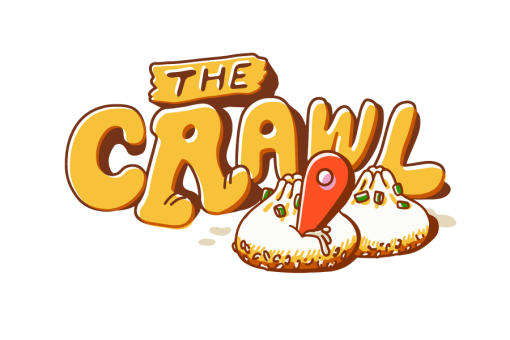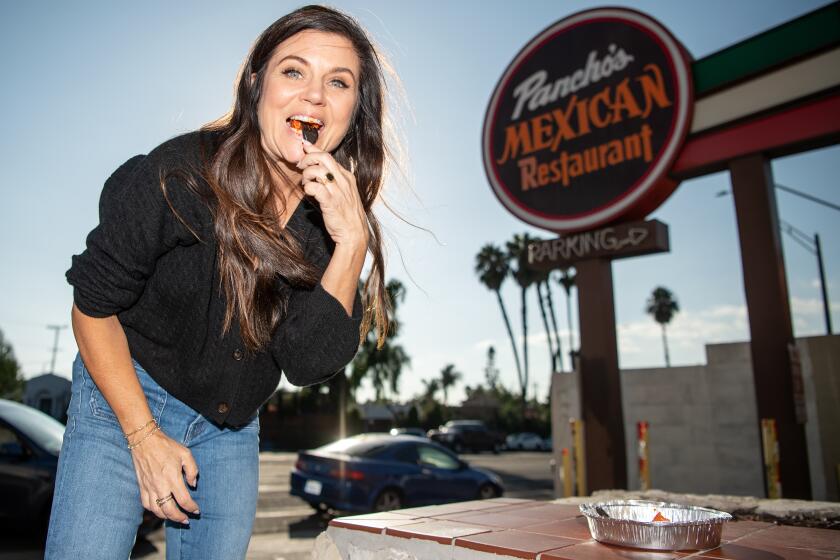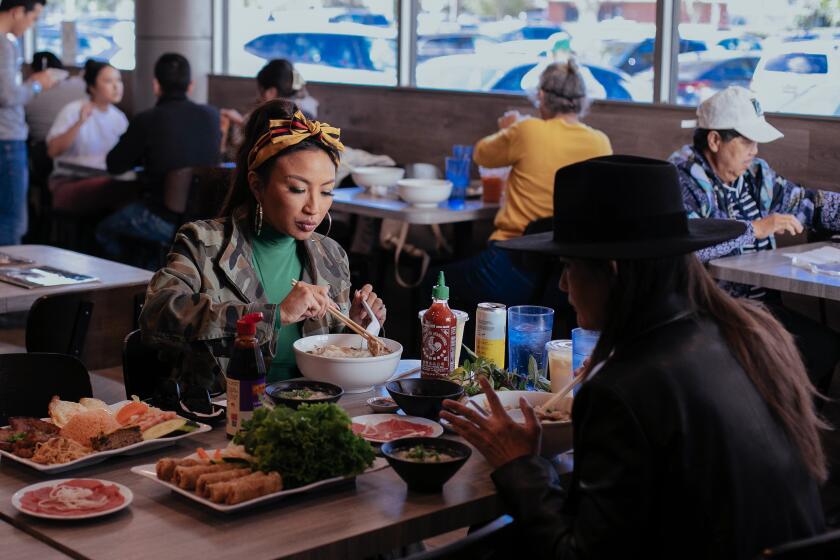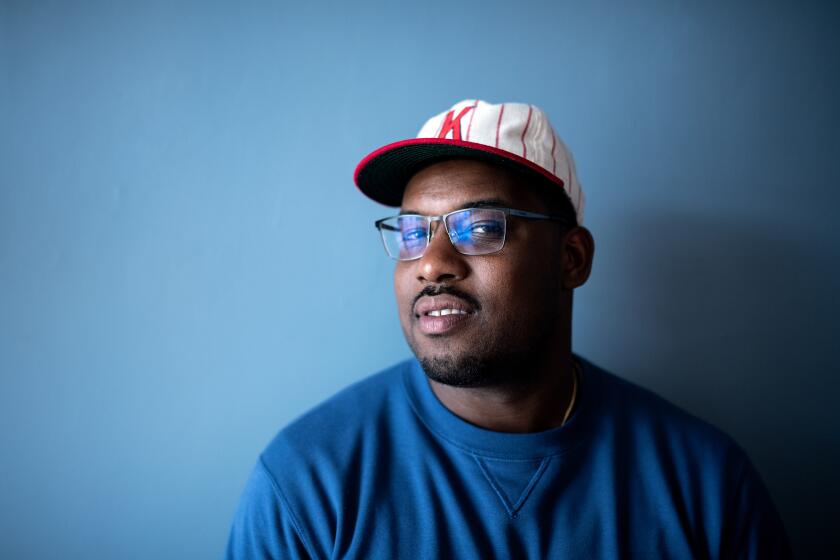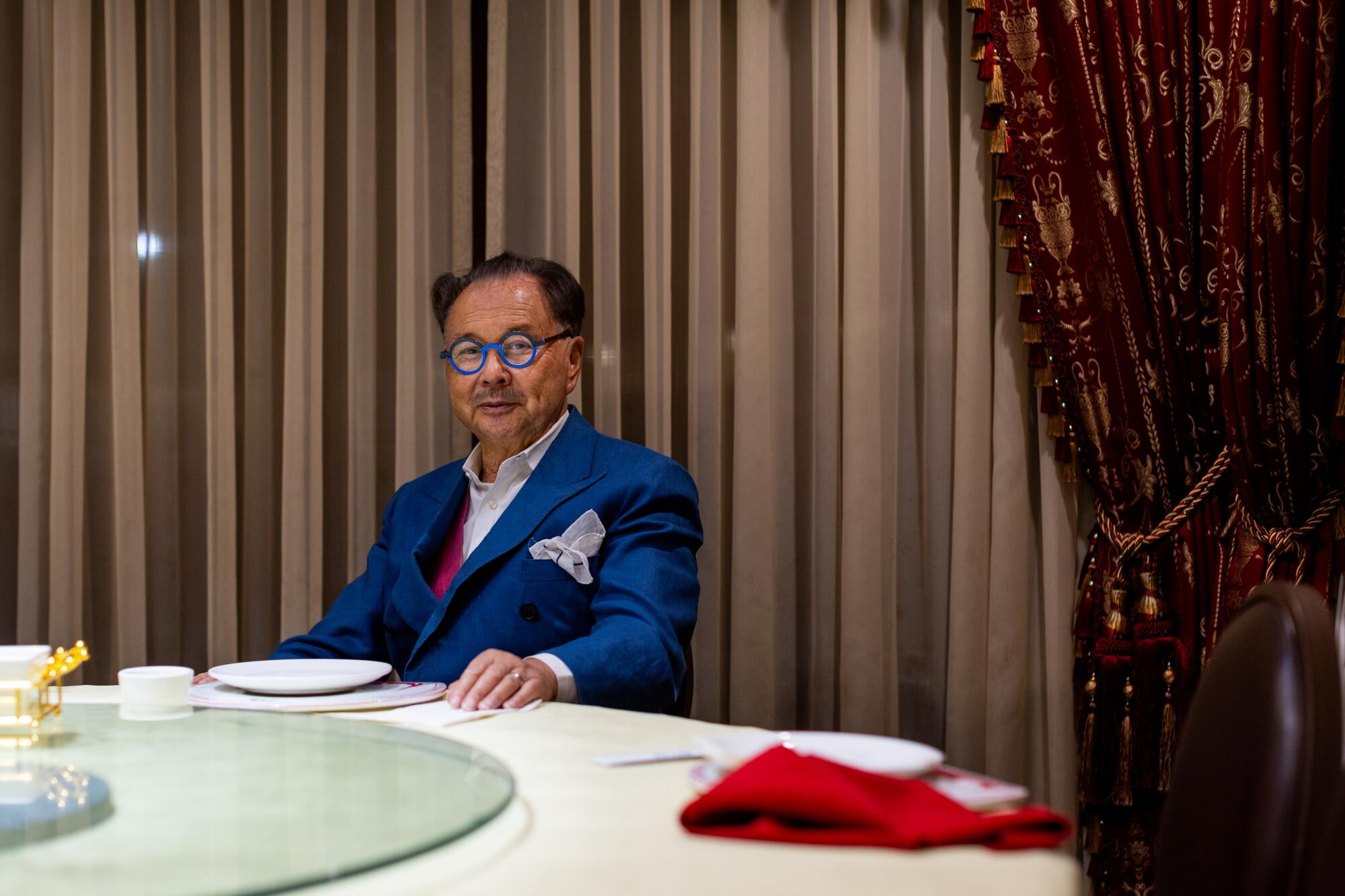
- Share via
Ongoing Series
Columnist Jenn Harris joins your favorite celebrities to explore their go-to cuisines and restaurants in Los Angeles.
Michael Chow likes to name-drop.
“I did a movie called ‘55 Days at Peking,’” he says, seated at the sushi counter at Matsuhisa in Los Angeles on a recent Friday morning. “It was a huge movie with Ava Gardner, Charlton Heston. I’m name-dropping. Bobby Helpmann, a huge, huge production.”
The founder of the Mr. Chow restaurant empire and subject of the recent HBO documentary “AKA Mr. Chow” has been in the orbit of the world’s biggest celebrities his entire life, and he wants you to know it. He’s turned casually mentioning the names of various stars he knows and calling on various film references into a form of art.
Among that group of A-list acquaintances is Nobu Matsuhisa, of the more than 50 Nobu restaurants and hotels around the world. Despite his busy travel schedule, Matsuhisa makes time to come by the restaurant to see his old friend.
“We’ve known each other a long time, almost 100 years,” Matsuhisa says.
“No, only 99,” Chow responds with a laugh, not missing a beat.
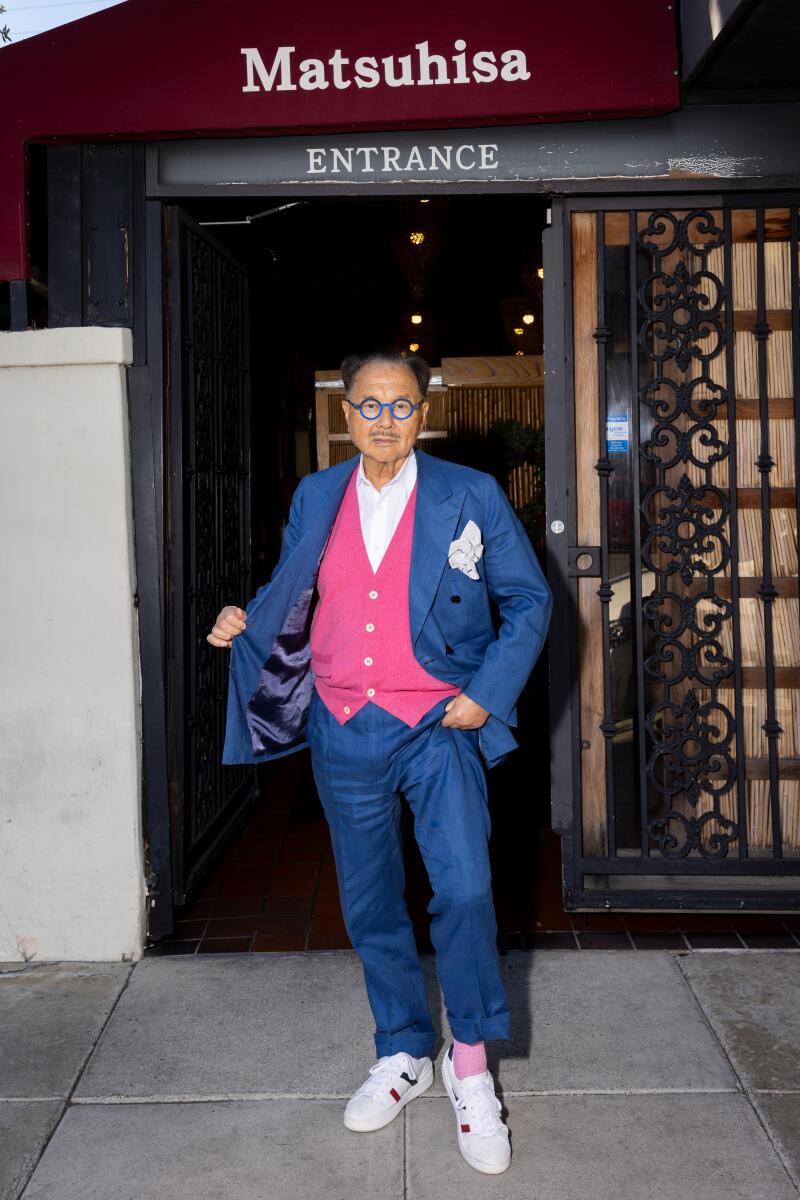
Chow shows off his sartorial side outside Matsuhisa in Beverly Hills. (Jakob Layman / For The Times)
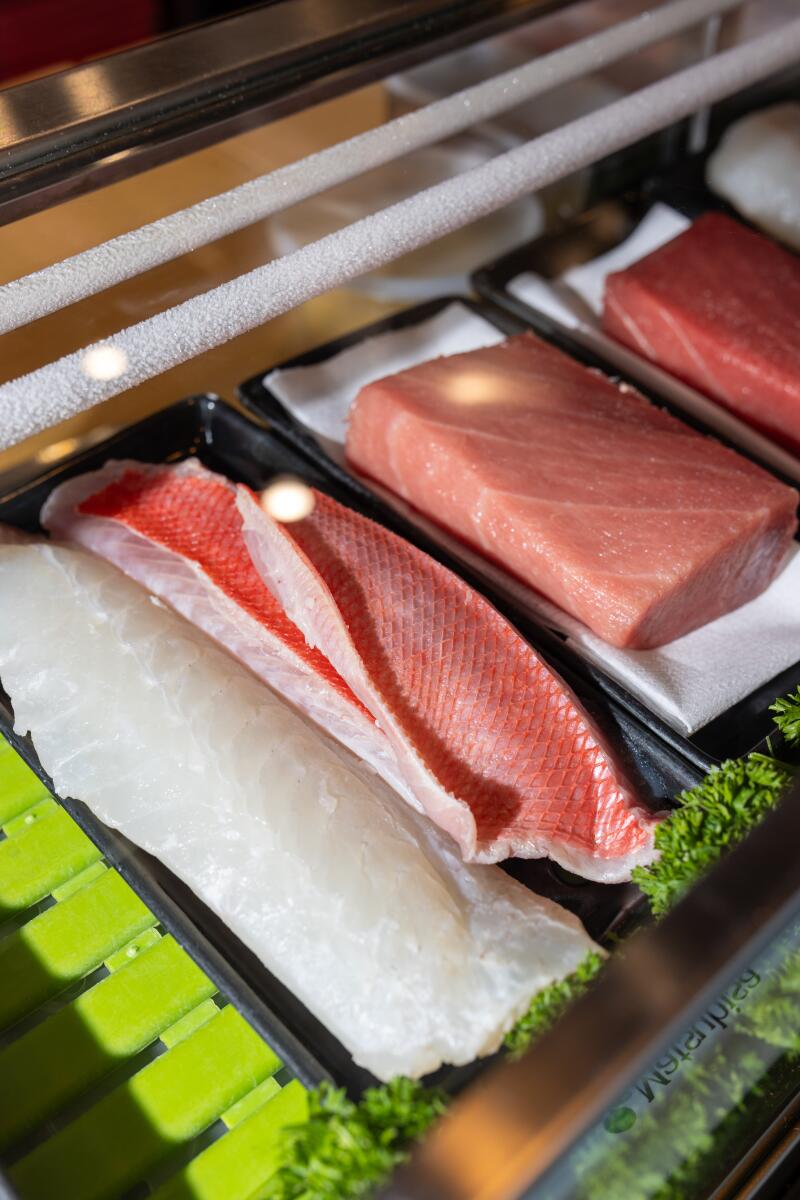
The day’s fresh fish at Matsuhisa’s six-seat sushi counter. (Jakob Layman / For The Times)
11:16 a.m. Matsuhisa
The two catch up for a few minutes before Matsuhisa heads off to another engagement. Seated at the six-seat counter, Chow, 85, has impeccable posture. He straightens his royal-blue suit and squints behind his signature round glasses, the two-tone frames a bright blue along the bottom and jet black along the top.
“We will do something minimal so we can survive the day,” he tells a chef behind the counter. “Can you make us chawanmushi for two? Some sushi, the caviar tacos, and you do your thing.”
Chow orders a hot green tea, then settles into his chair, preparing for the first of three meals on a restaurant crawl highlighting his favorite places to eat around Los Angeles.
The ‘Saved by the Bell’ icon’s food crawl began with Southern-fried frickles and ended with Michelin chocolate cake. No wonder her new cookbook levels up leftovers.
“Nobu is the father to give birth to the whole cuisine of Japan to the world,” he says. “Chinese food, on the high end anyway, belongs to me, if I may not so modestly say so. I’m very proud of the fact that I was able to contribute to Chinese culture.”
Chow is a pioneer of high-end Chinese cuisine outside of China, having built his brand and reputation on restaurants with prices and flair that at the time were mostly reserved for Eurocentric cuisines.
“Basically, the idea of Mr. Chow is to be like theater and to promote the greatness of Chinese cuisine,” he says. “It’s tremendous, the most sophisticated, most complex, with so many different regions. There is no cuisine like that on this earth.”
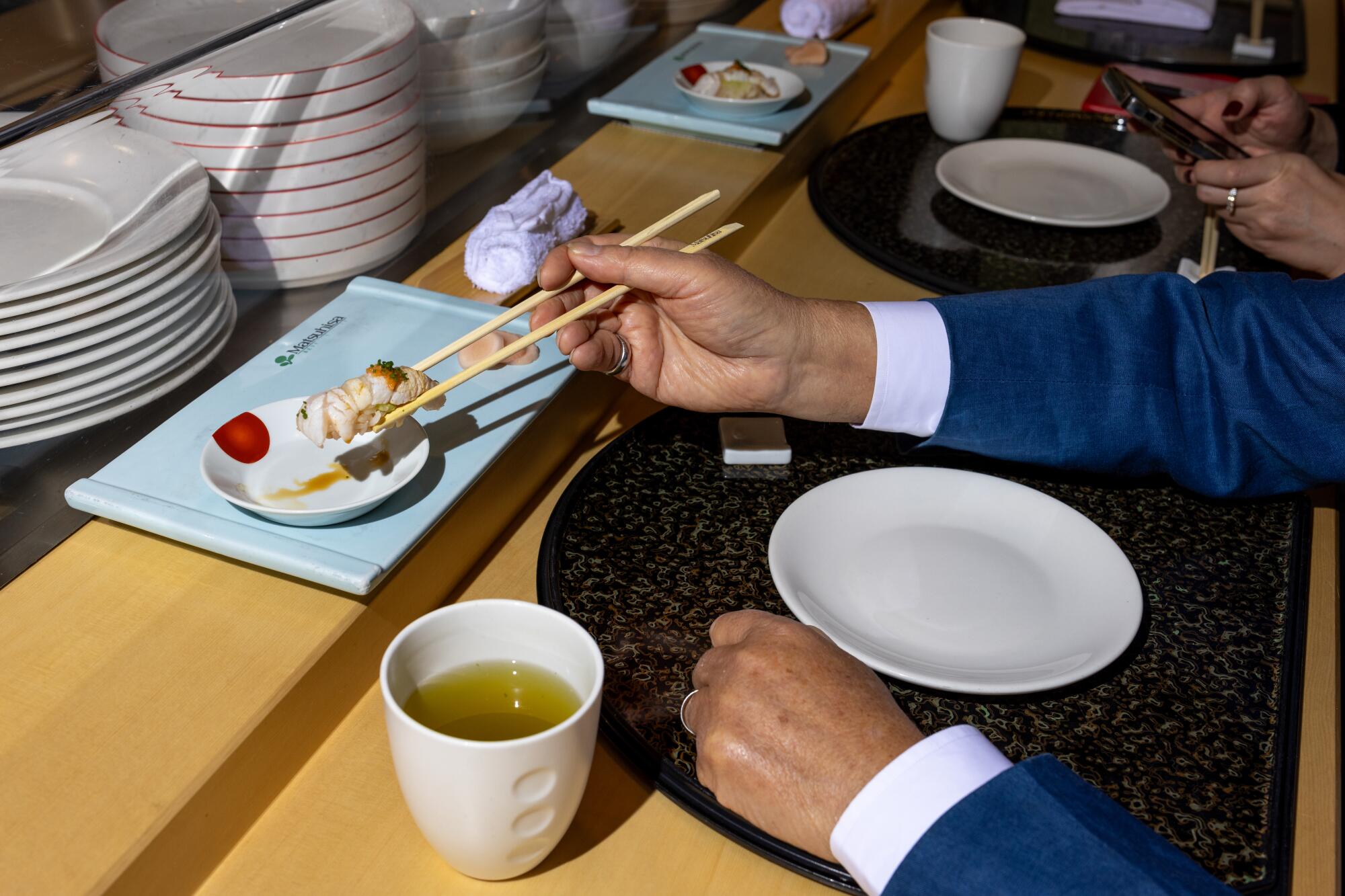
With chefs he selected from Beijing and Hong Kong, Chow opened the first Mr. Chow in 1968, in the upscale Knightsbridge neighborhood of London. From that first evening, the restaurant was a glamorous dinner party where the art world, pop culture icons and celebrities from every industry mingled over hand-pulled noodles. The Beatles, the Rolling Stones and Andy Warhol were all there. On the walls and peppered throughout the room was art from Peter Blake, Jim Dine and Clive Barker. And acting as overall vibe master was Chow.
“How did I make the most beautiful restaurant in the world?” he says. “Very simple. All these trillions of details. When that is accumulated, it’s very powerful.”
He kept a close eye on the dining room . Chow created what he calls the “Italian crowd,” employing charming Italian waiters who wore bowties. Instead of chopsticks, there were forks and knives. If the diners couldn’t use chopsticks properly, Chow saw it as an insult to the cuisine, so he decided to give patrons cutlery most would be comfortable with.
For this installment of The Crawl, our celebrity food crawl series, Jeannie Mai Jenkins, host of the new ‘America’s Test Kitchen: The Next Generation,’ takes us on a four-hour, three-stop Vietnamese food crawl around the San Fernando Valley and shows us the right way to eat pho.
“Another thing is when you call Mr. Chow, they are supposed to say Mr. Chow, always going upwards.” He raises his voice when he says the name of the restaurant with a practiced, pleasant lilt.
“Always optimistic,” he says. “And the No. 1 things for hosts is to look you in the eye. I can assure you that 90% of high-end restaurant hosts don’t look you in the eye. It’s like that line from ‘Scarface’: ‘The eyes, Chico, they never lie.’”
The never-ending dinner party continued well into the ’70s, with the opening of a Mr. Chow in Beverly Hills in 1974. The Beverly Hills restaurant drew megastars from the art world, Hollywood and the music industry, with help from A&M Records founder Jerry Moss, who helped fund it. Chow went on to open locations in New York, Las Vegas, Miami and, as of last year, Saudi Arabia.
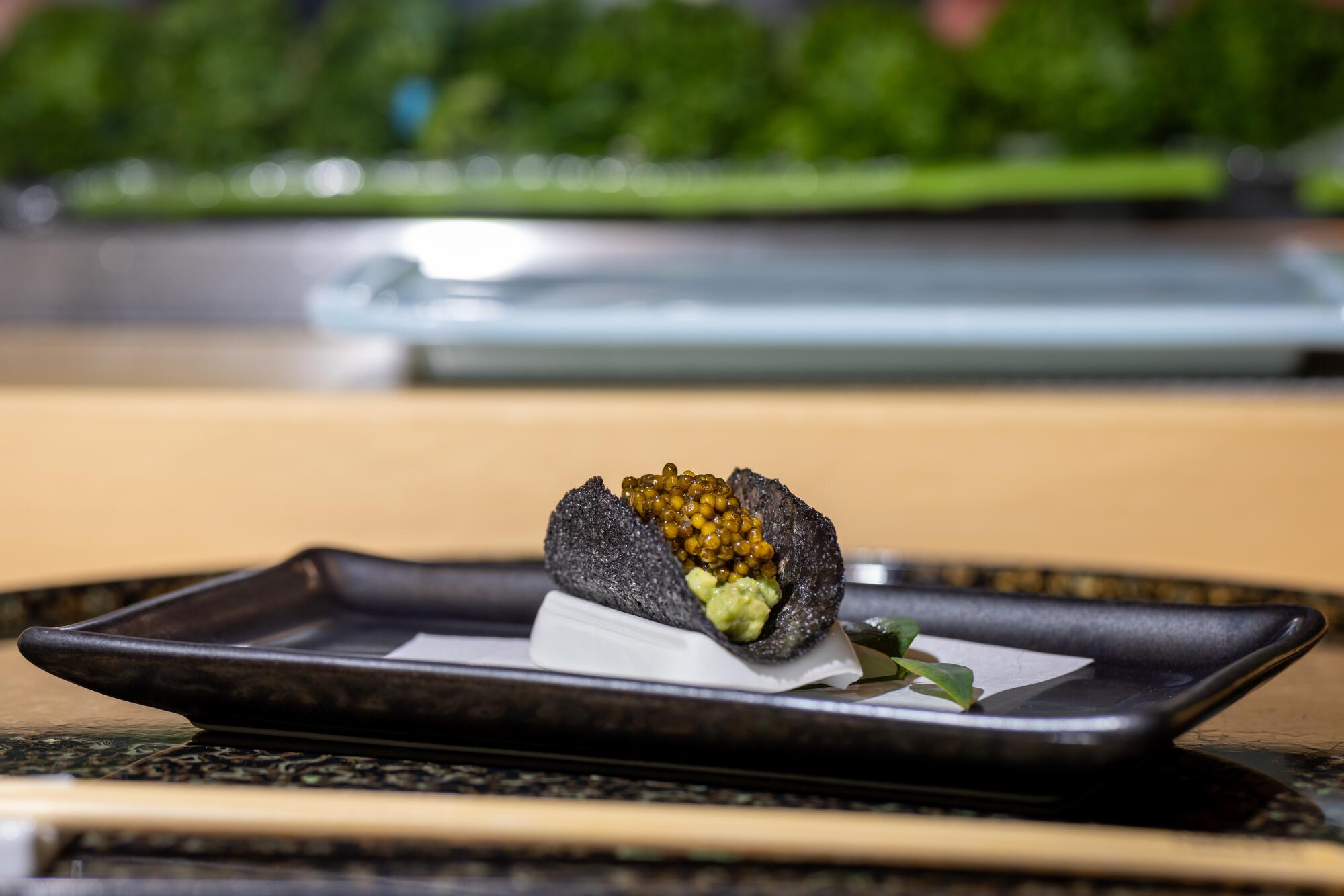
Our caviar tacos arrive just as Chow is rattling off some of his celebrity regulars. “I met everybody,” he says. “Marlon Brando. He was one cool mother f—. Federico Fellini. Francis Bacon. Name dropping.”
The rounds of seaweed are crisp and curved, cradling a smear of mashed avocado and a heap of caviar. Chow eats his taco in two bites, chewing slowly and nodding to himself.
“I save up for a few months before coming here,” he says. “Just kidding. But really, it’s very refined and mixing high and low culture. You know what I’m saying? All great chefs, it’s something very personal, you know? That’s the magic.”
‘The Bear’ star Lionel Boyce takes us on a food crawl through Inglewood for breakfast, soul food, doughnuts and chicken wings.
Next comes the chawanmushi, a savory custard served in a small lidded bowl crowded with uni and lumps of King crab.
“This is an egg custard which is also interpreted in Chinese cuisine as well,” he says. “They make it particularly well, very specific and very sophisticated.”
He removes the lid from his bowl and gently prods the custard with his spoon.
“Now we are getting the goodies,” he says.
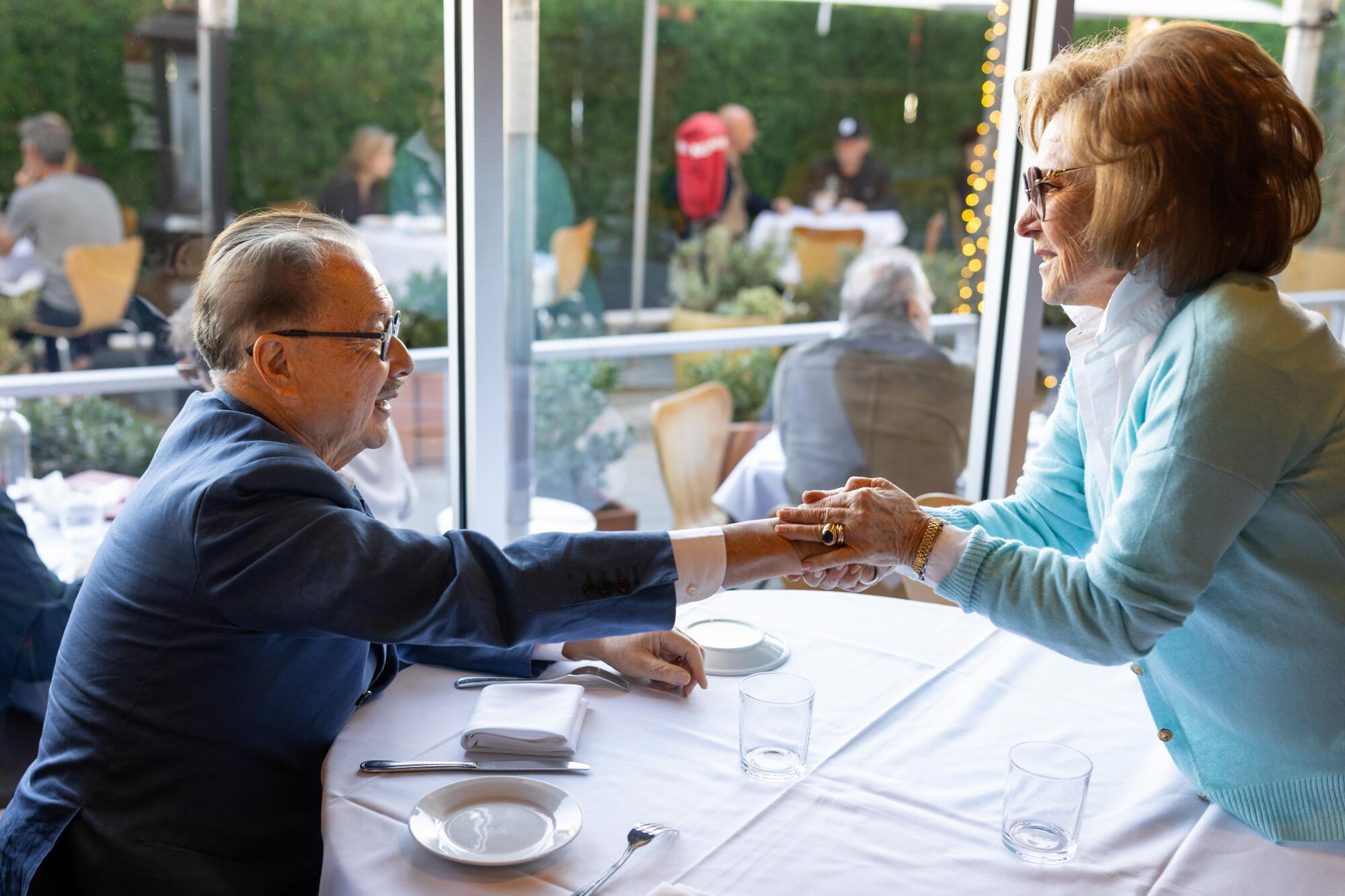
12:38 p.m. e. baldi
Diners at e. baldi restaurant in Beverly Hills turn to stare at Chow as he walks into the crowded dining room. The host is visibly flustered, annoyed that she doesn’t have Chow’s usual table outside ready for him. She seats us at a booth near the window as other diners call out to him.
“I just want to say I love you,” says a woman who approaches the table to shake Chow’s hand. “I was watching your documentary. Can you put my son in a movie?” She leans over to show Chow a photo of her son on her cellphone.
“Kiss Vanessa and the kids,” she says, referencing Chow’s wife and two young children.
“Give Al a big kiss, darling,” he replies.
“You know who that is, right? Her baby is Al Pacino’s baby. See? Name dropping.”
All the attention and fuss seems to invigorate Chow, who is now smiling and effortlessly charismatic. He’s a regular at the restaurant.
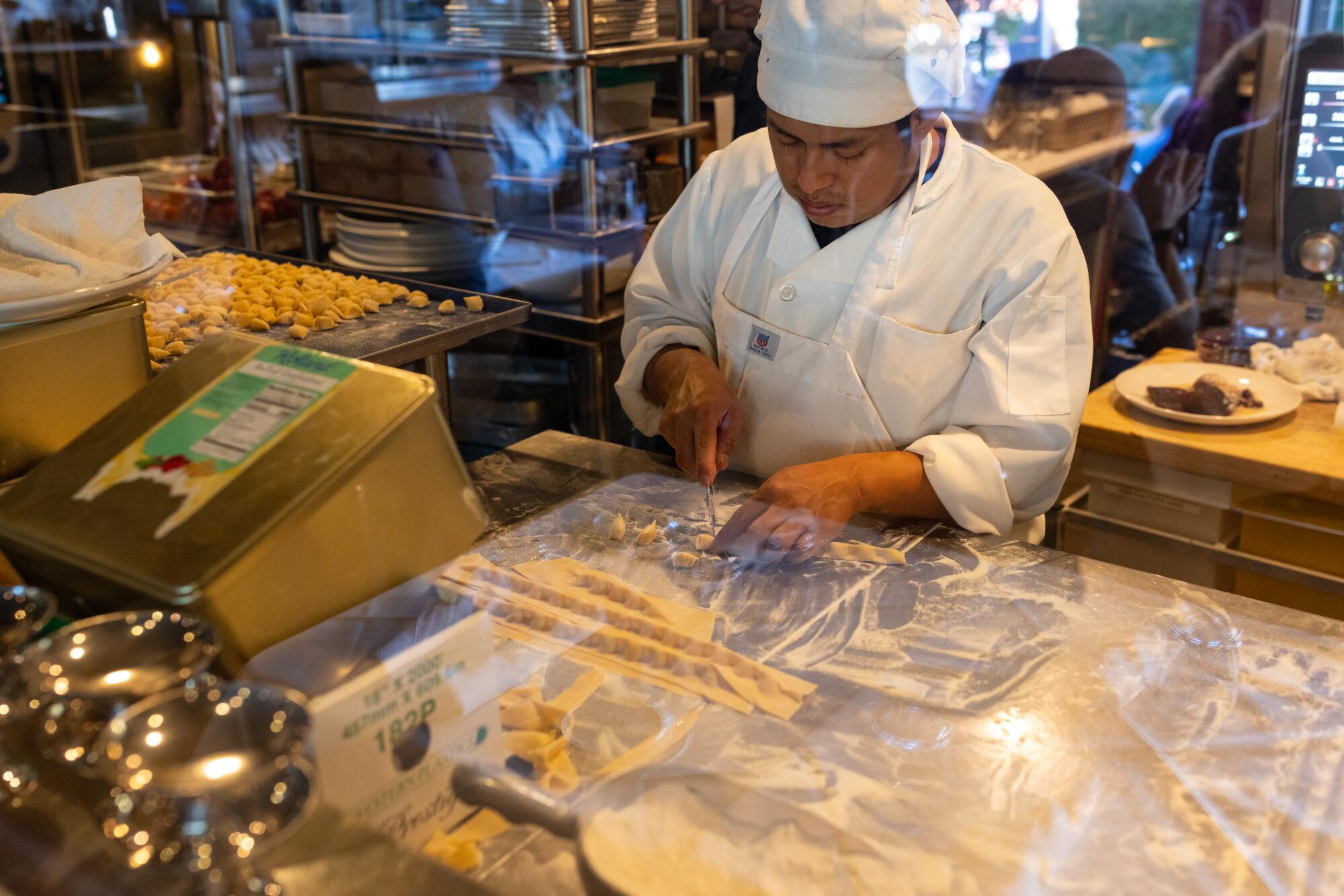
“I think Edoardo [Baldi] is one of the best chefs for Italian food in America,” he says. “He is only open if he can cook every dish. If he can’t come for whatever reason, he doesn’t open. He’s so dedicated he makes me look ridiculous!”
Chow orders his favorites: Florentine-style crostino di polenta with a porcini mushroom sauce; beef carpaccio with truffle sauce; and spaghetti with bottarga. He asks our server for the day’s special and can’t refuse the risotto with white truffles.
While we wait for our food, Chow says he was reluctant to do the documentary, worried that it would somehow signal his mortality in a way he’s not yet ready to acknowledge.
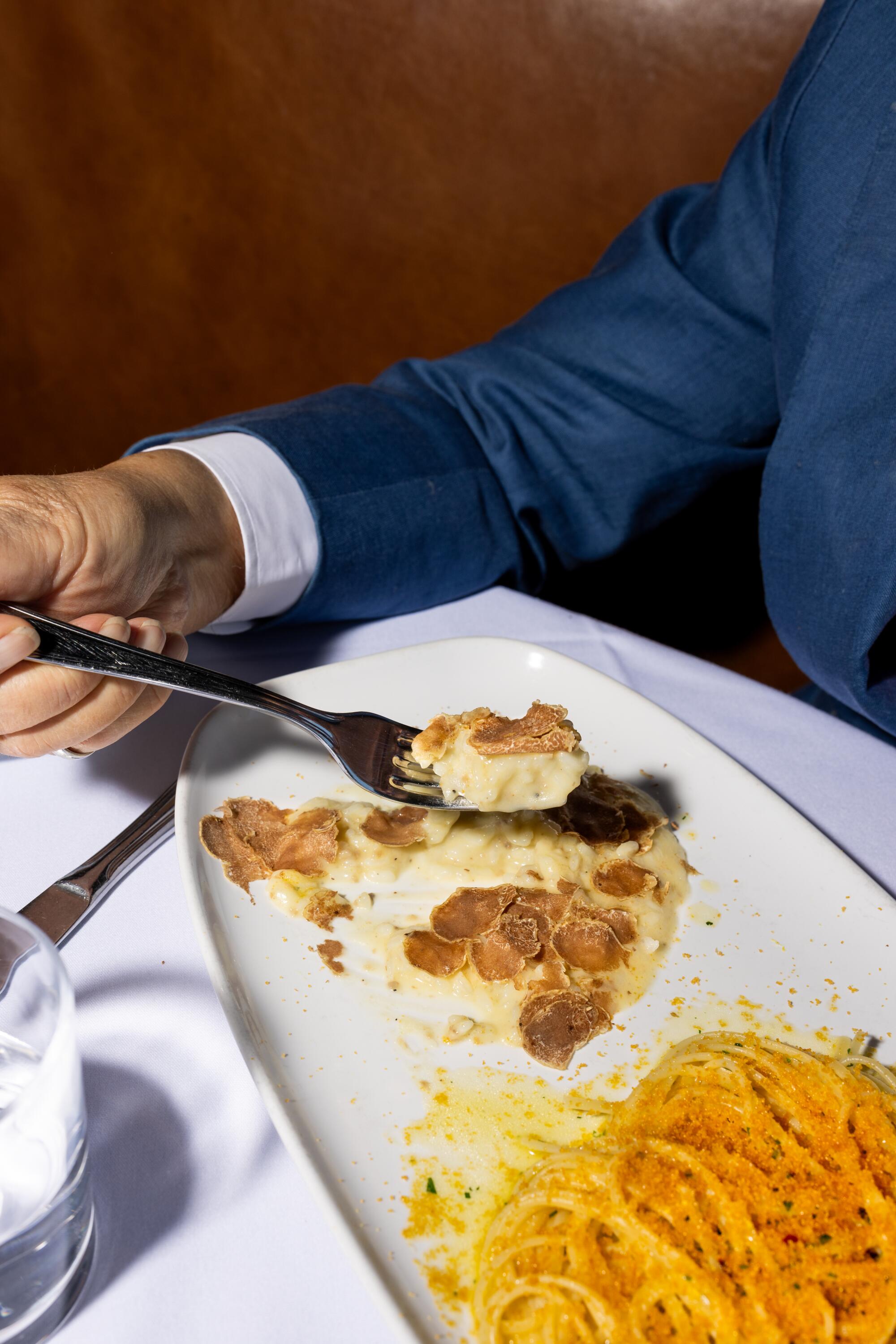
“I said, ‘I’m not going to die, so why?’” says Chow. “But it was as if I’ve been sent here to prepare for this moment in our history between China and the United States, and in my egoistic mode, since the success of everything, I suddenly have this thought that maybe I can contribute a little to the peace in the world. You follow me?”
Part of the hesitation also came from not wanting to visit Chow’s difficult history. The film touches on the tragic downfall of his family during China’s Cultural Revolution. Chow was sent to live in London as a boy; his father, Zhou Xinfang, a grand master of the Beijing Opera, was imprisoned by the Red Guards. His mother was killed.
“A lot of things had been buried in me and my heart got turned to stone a long time ago,” he says. “But the more they beat me, the more it gives me strength. Vivien Leigh in ‘Gone With the Wind.’ Midintermission. The last shot. ‘I will never be hungry again.’ You see?”
Chow’s mood lightens when our first course arrives, a rectangle of polenta buried under a light tomato sauce with sliced mushrooms. Next is the carpaccio, the rounds of raw beef arranged neatly in a circle dressed with a truffle cream sauce. The spaghetti with bottarga hums with the pronounced saltiness of cured fish roe. The risotto grains are perfectly al dente and creamy, the surface of the rice covered in shaved white truffle.
As we finish our lunch, Chow calls for someone to bring a bottle of Dom Perignon to a table of four women in the center of the dining room. They gasp in surprise when the server presents the bottle, “compliments of Mr. Chow.”
“Thank you, Mr. Chow!” They sing in unison.
“You’re welcome, darlings. It’s only the cheapest Dom Perignon they got,” he replies with a laugh.
“Isn’t that wonderful? That’s what restaurants are all about. If nothing is happening, create something.”
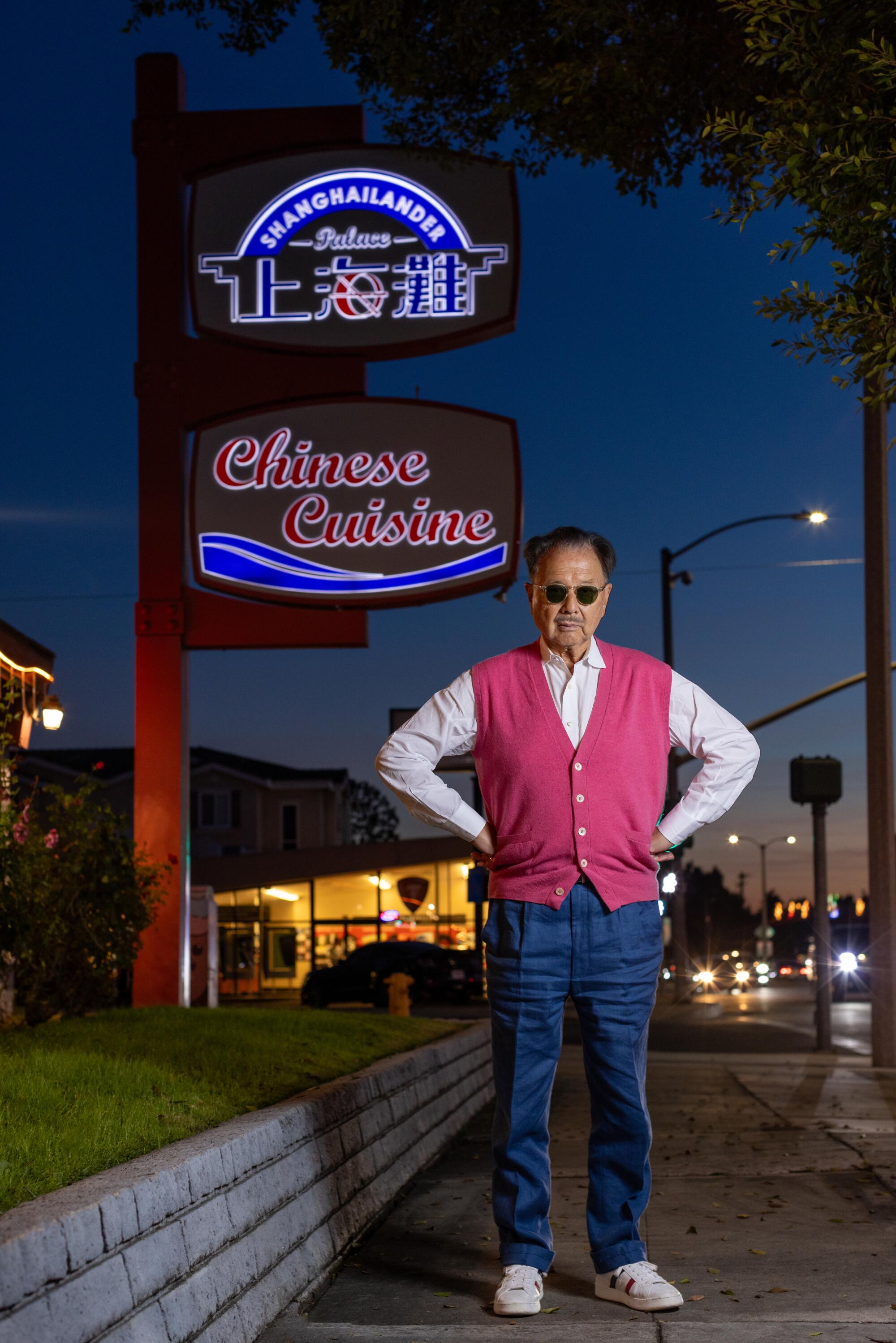
5:02 p.m. Shanghailander Palace
Chow seems to order half the menu from a private dining room tucked away to the side of Shanghailander Palace in Arcadia. He asks for the beef tongue, original shrimp, sauteed eel, Shanghai pork trotter, salted pork with bamboo shoot soup and Shaoxin wine chicken.
“It’s very authentic Shanghainese,” he says. “In Mr. Chow’s case, I curated the menu for over 50 years. In the beginning, I just had my childhood favorites from Shanghai. Here, there are specific famous dishes and certain very classic dishes.”
After a day spent discussing food and how to run restaurants, this is the most he’s offered regarding the menu at his own restaurants. With the word Michelin on every high-end restaurateur’s lips, Chow couldn’t be more blasé about the opinion of critics or his restaurant’s inclusion on certain lists.
Whenever I take my friend Sy to Mr Chow, he tells me wonderful stories about London in the ‘70s, when the original Mr Chow there was the place, the first hip Chinese restaurant anywhere.
“Historically, 99% of my reviews are negative,” he says. “All racism in my opinion. Not that I don’t have bad food. Sometimes it’s bad. If you speak like this (imitates a French accent), your food must be good. If you speak like this, Chinese, it’s s—, right? I dared to challenge the critics. I’m chicer than they are so they go, ‘How dare you, this low-life?’”
In the early ’80s, Chow sought legal damages in federal court after a scathing review of his East 57th Street Mr. Chow restaurant in the Guide Gault-Millau. Chow, ever the showman, brought his noodle chef Stephen Yim to prepare noodles and pancakes for the jury. He initially was awarded $20,000, but the verdict was overturned on appeal on 1st Amendment grounds.
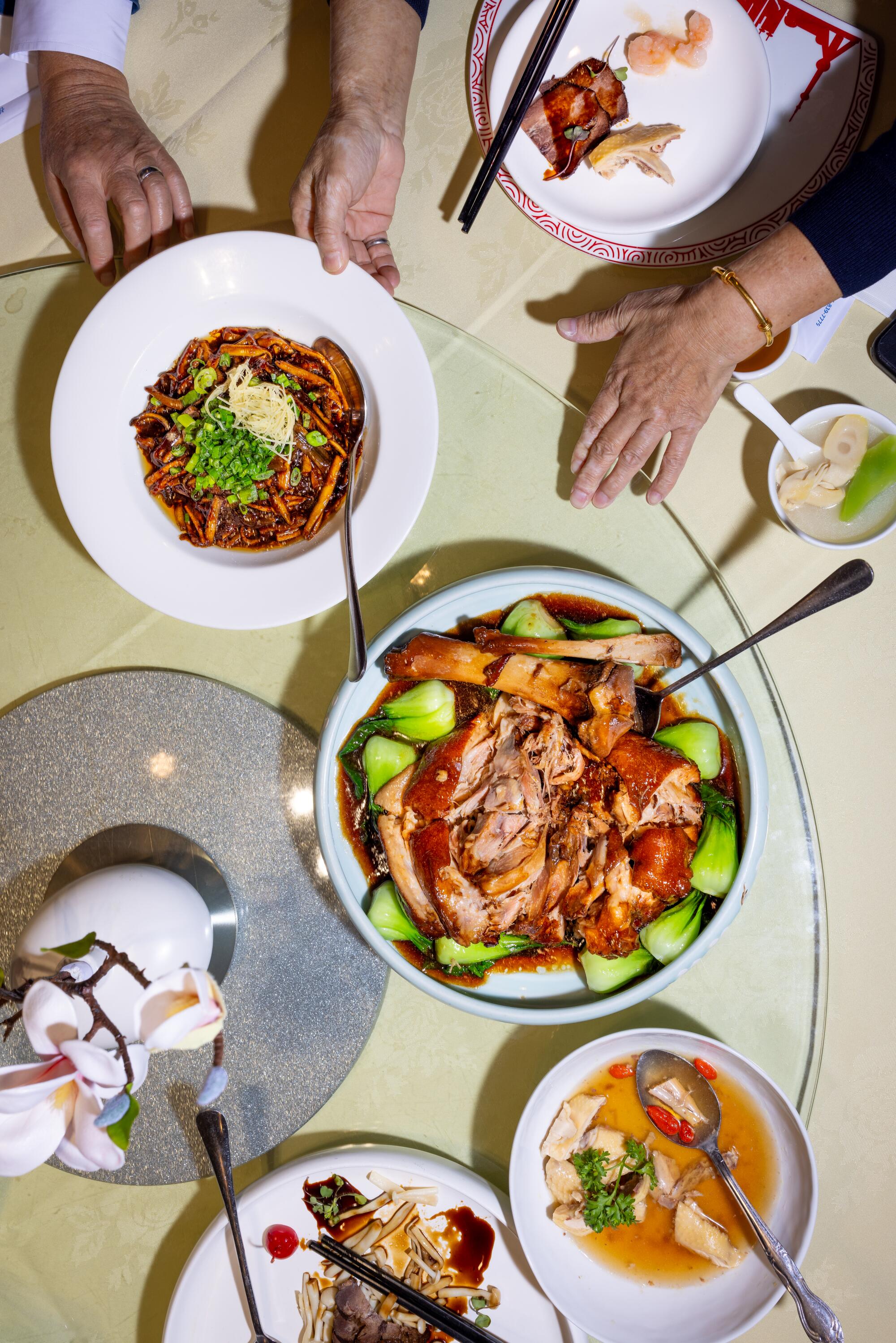
About 10 minutes after we order, the door to the room bursts open and multiple servers start to fill our lazy Susan with platters of food.
“That’s a very famous dish they have in Shanghai,” he says, pointing to a plate of shrimp. “It’s very difficult to cook. A little bit too plain for the Western palate.”
The pale pink shrimp are uniform in size and color. They’re rich but subtle, tasting of nothing but pure shrimp.
He sips the pork soup and uses his spoon to show me a knot of tofu skin.
“It’s an acquired taste and when I have it, it reminds me of my childhood,” he says.
The Shanghai trotter is a massive hunk of wobbly pork served over a bed of bok choy. The meat is soft and fatty, cooked down so long that it capitulates under the slightest touch. A bowl of sauteed eel tastes strongly of white pepper and scallions.
When we get to the chicken, Chow warns me that the cooking wine has a strong, “weird taste.” That bitter, almost briny flavor is welcome, elevating the tender meat to something more savory and compelling.
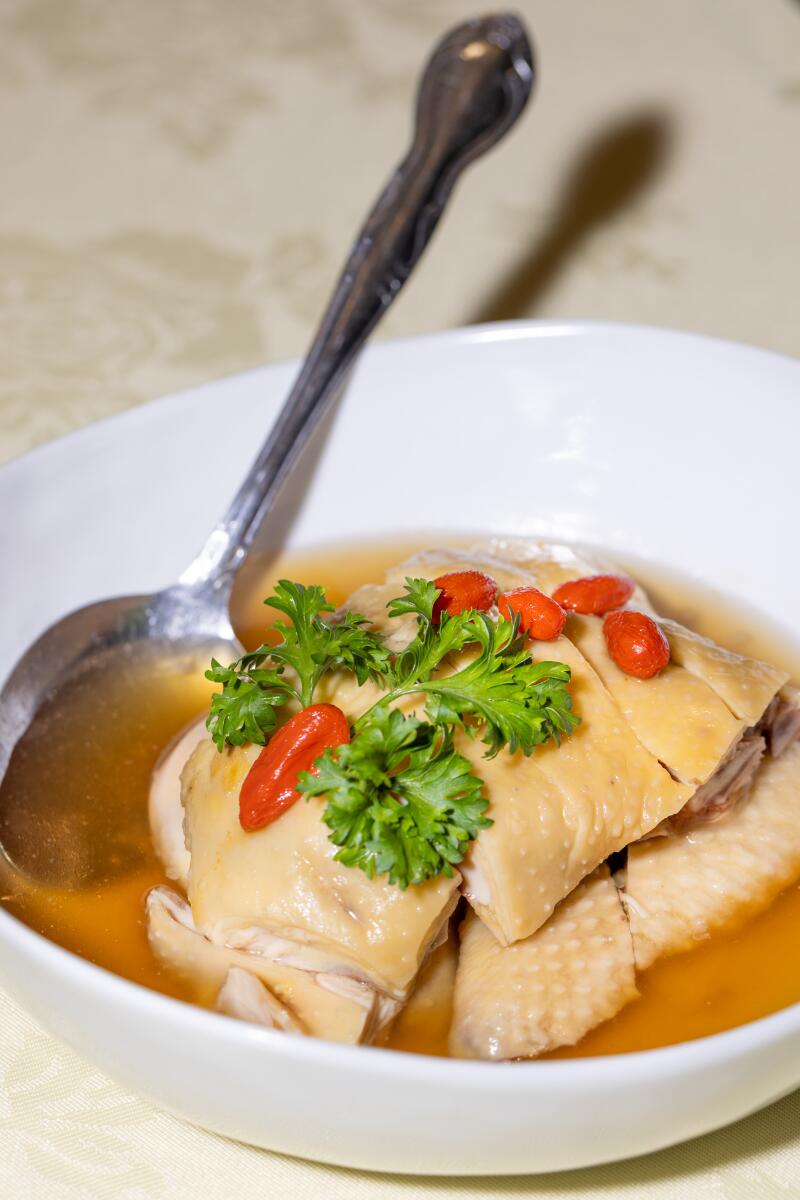
Chow says the cooking wine for the chicken has a strong, “weird taste.” The bitter, almost briny flavor adds a savory dimension to the dish. (Jakob Layman / For The Times)
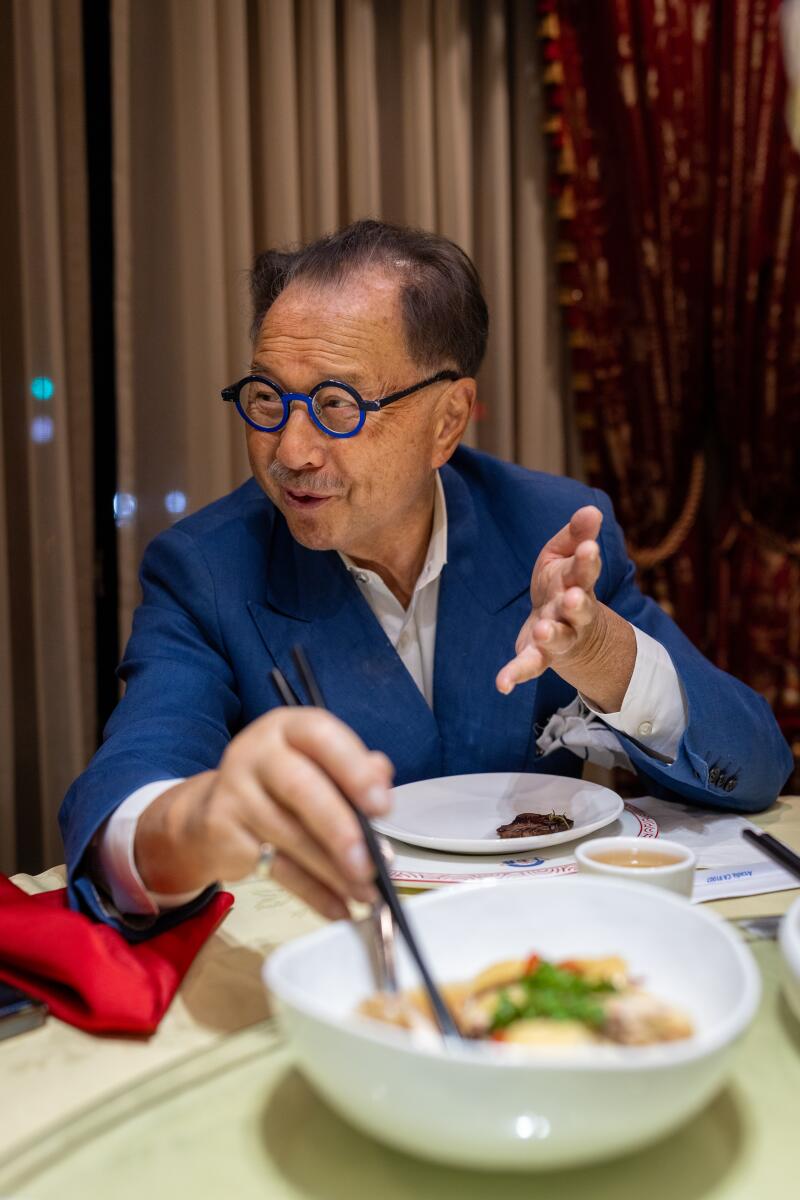
“It’s very authentic Shanghainese,” Chow says. “Here, there are specific famous dishes and certain very classic dishes.” (Jakob Layman/For The Times)
“My intention with Mr. Chow is to be 85% authentic and to try to educate and introduce more and more food,” he says. “We have a drunken fish cooked with a little bit of wine. In the beginning nobody would eat it. Now people are beginning to eat it.”
He pauses for a moment, then starts to tear up.
“Take Anthony Bourdain, his attitude, his humanness, I’m getting emotional talking about it. When he visited everywhere, the first thing in his heart was respect. That sounds very simple, but it’s a very big deal. From that all goodness comes. You know what I mean?”
Shanghailander Palace restaurant owner Jane Kong stops by our table just as a second wave of food arrives: a two-tiered tower of dumplings filled with pan-fried buns and sweet rice and pork siu mai; fried fish filets with enough threads of seaweed in the batter to give them a green hue; and a steamer full of xiao long bao.
“I remember your father,” she says to Chow. Kong, who is also from Shanghai, was a fan of Chow’s father’s operas.
Chow invites her to sit with us, and the two have a lengthy, spirited conversation about longevity and the consistency of their restaurants.
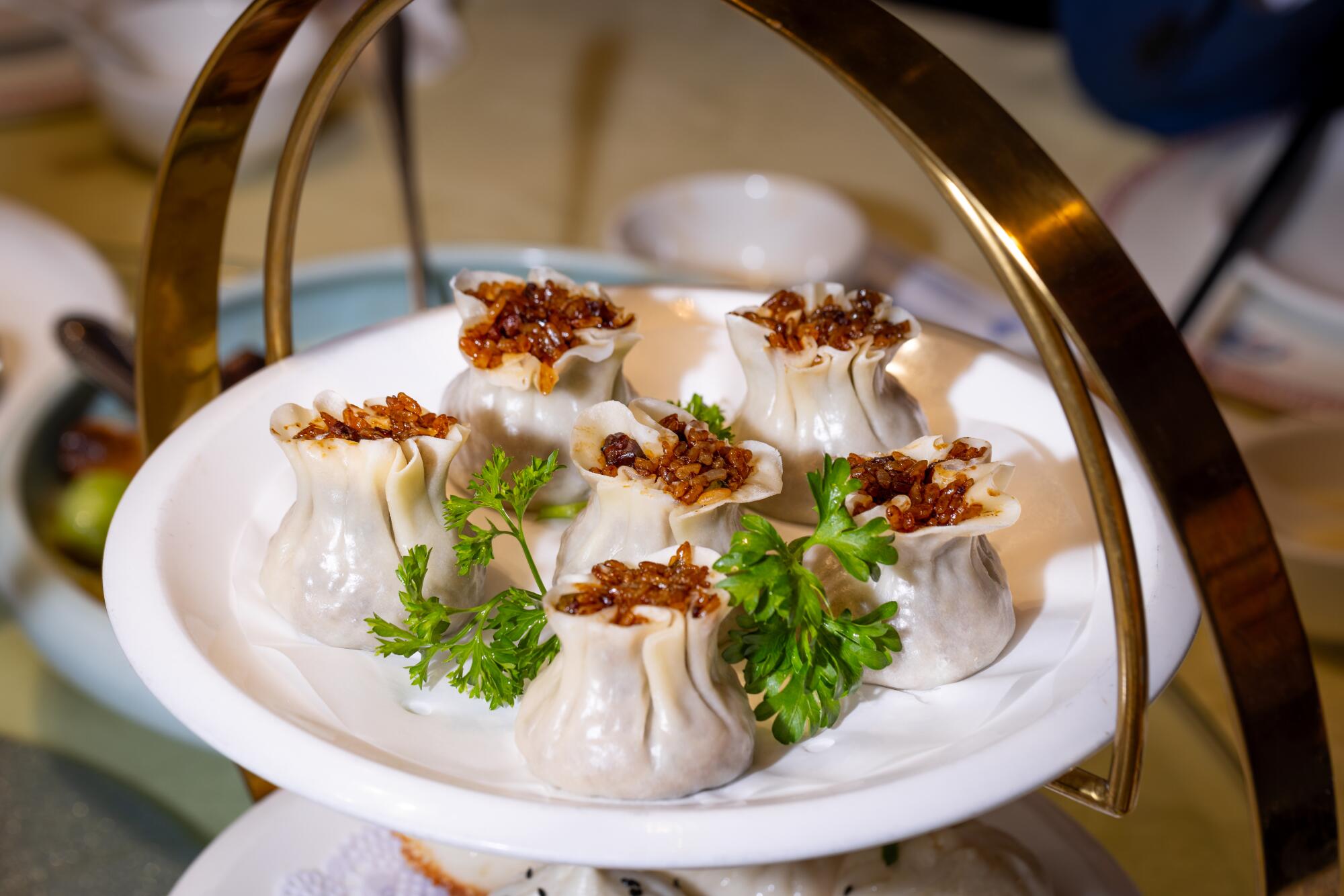
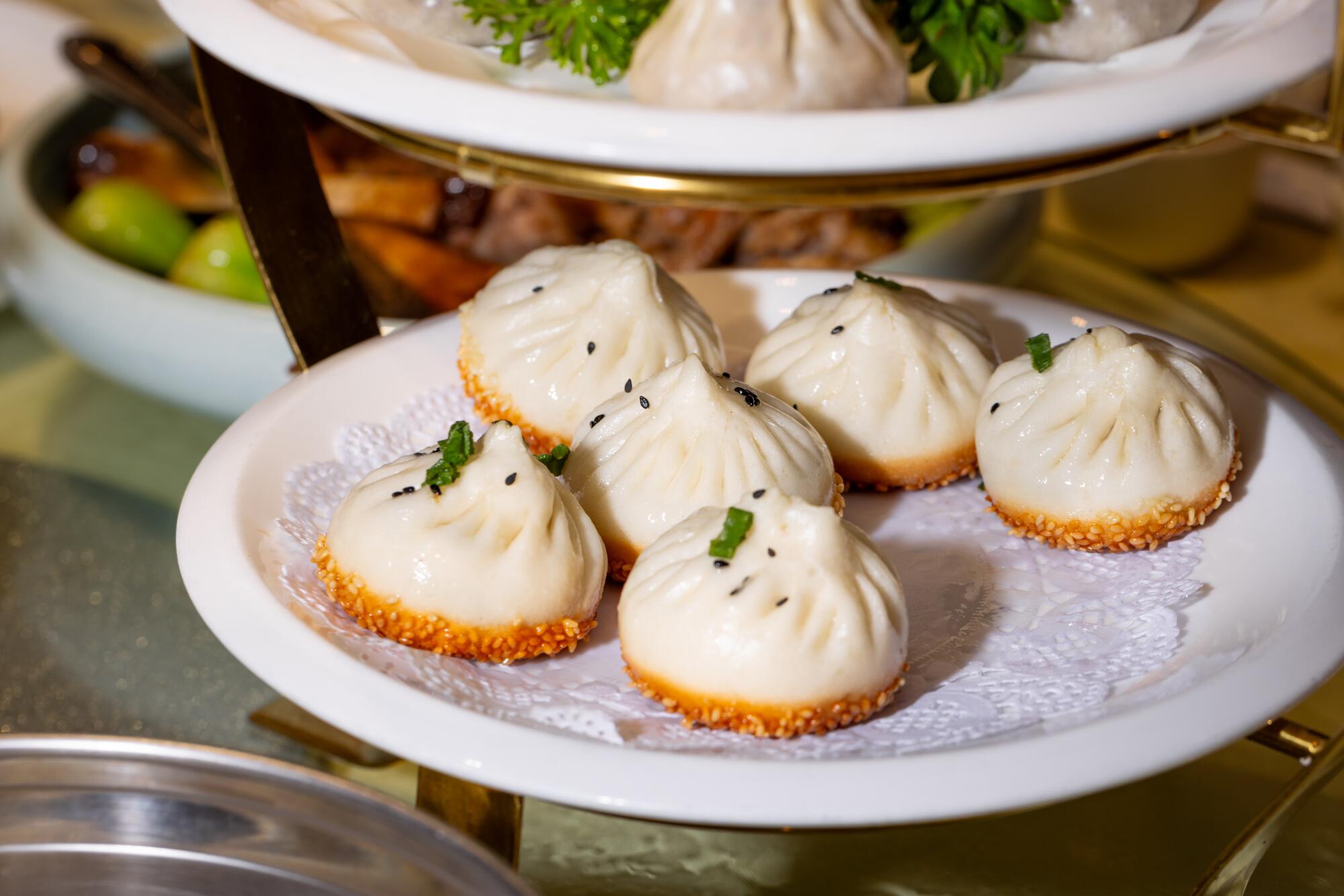
Little about the Mr. Chow restaurants has changed over the years, from the menu to the decor, the careful dynamics of the room, the warm welcome and eye contact at the door. During a recent visit to the the Beverly Hills location, it could have been 1990 or 2024 with the dining room buzzing and full. The temperature was comfortable, the lighting just right, and there was that feeling that at any moment, a star like Oprah or Jack Nicholson could enter your orbit. If your perception of Los Angeles restaurant culture was formed at places like Spago, Chasen’s and Craig’s, Mr. Chow is, and always will be, the place to be.
“You don’t change the Mona Lisa,” Chow says. “A classic is a classic, and it should be preserved. I have longevity in the sense that we survived every night. Every night is a challenge and we’ve been open for more than 50 years. It’s because every detail is a universe. You follow me?”
I do.
Restaurants from the Mr. Chow crawl
Matsuhisa, 129 N. La Cienega Blvd., Beverly Hills, (310) 659-9639, matsuhisabeverlyhills.com
e.baldi, 375 N. Canon Dr., Beverly Hills, (310) 248-2633, ebaldi.com
Shanghailander Palace, 1440 S. Baldwin Ave., Arcadia, 626) 348-8866
More to Read
Eat your way across L.A.
Get our weekly Tasting Notes newsletter for reviews, news and more.
You may occasionally receive promotional content from the Los Angeles Times.

